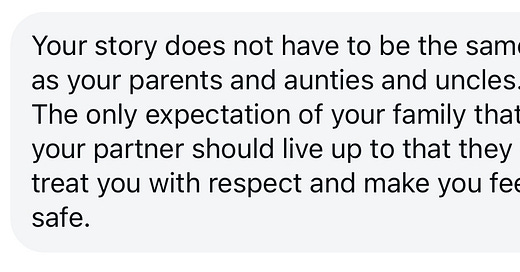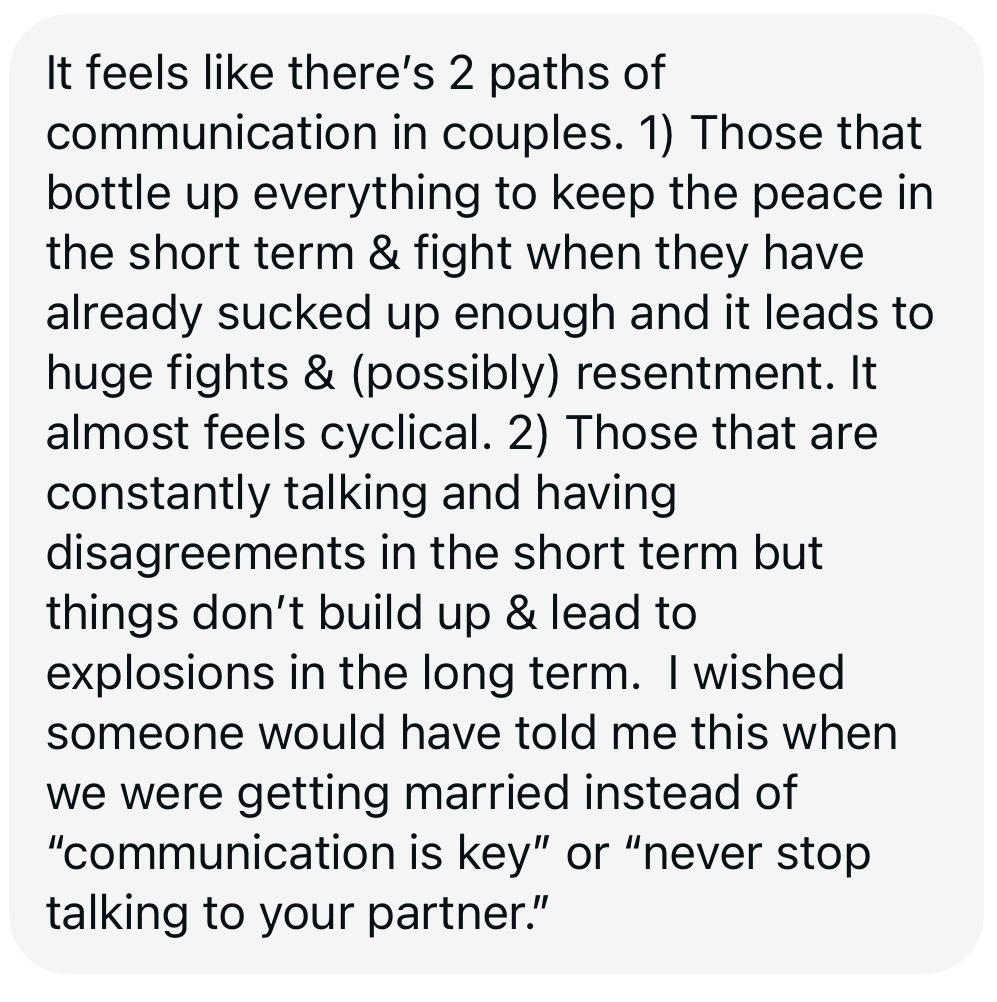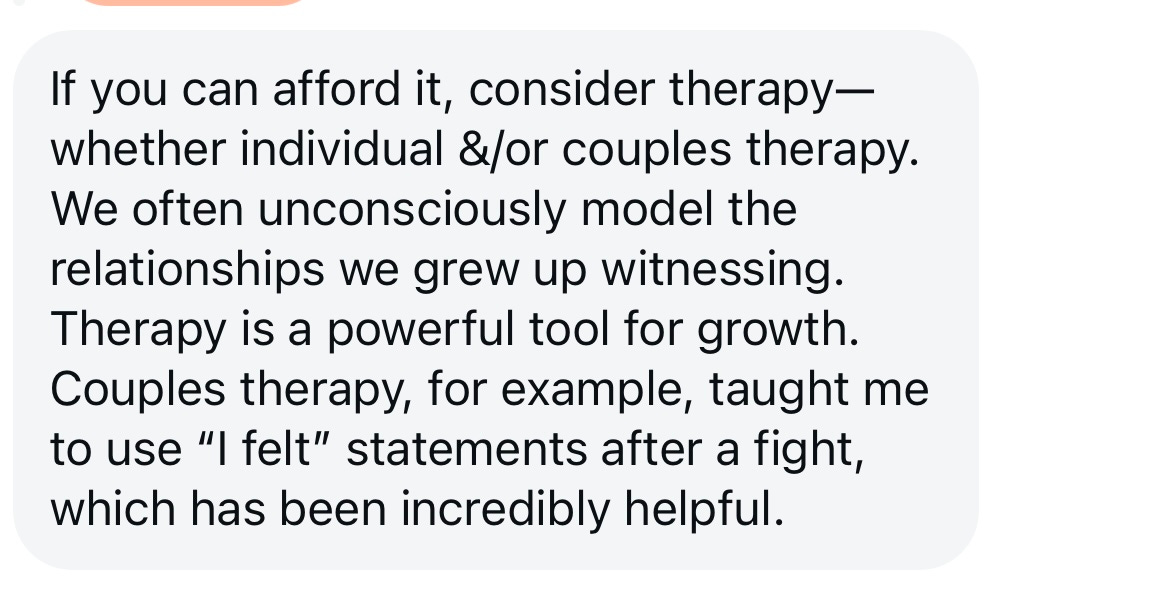Pssst. I’m coming to Philly and Portland, OR in a few weeks. Get your tickets and learn more here (space is limited!)
Our first book club (usually for paid subscribers but open to everyone this month!) will be on February 24 at 9-10pm ET. We are reading Hijab Butch Blues. See you there! Link will be sent out day of.
Mark your calendars for the upcoming paid subscriber community conversation over Zoom: Feb 18th — at 6pm ET. Link to Zoom will be sent day of.
Paid subscribers now get access to this unlimited chat function with me and each other!
I’ll be sending out an update post in the coming week or so with all the new updates and offerings and scheduling moving forward (this includes one live community event A WEEK and more!!). This means that if you want to sign up for paid I haven’t increased the price yet… just saying ;)
I’m sorry this essay is a bit late. When I asked the Brown Girl Therapy community “if you’re in a ‘healthy’ romantic relationship, share a piece of advice” and ooohhhhwwweeee we got HUNDREDS of responses in the DMs. I went through them all, and it took me a long time! I wanted to share your voices, because as you know my work is about not gatekeeping YOUR voices, so with that said, here are the themes that came up repeatedly:
And I want to be clear that as a couples therapist, I endorse these wholeheartedly and add my own two cents of how I build these with my couples in therapy!
Communication
Create fair fighting rules. This is something I do with my couples. We create a contract that they both agree to. It’s not complicated or too detailed — we want to ensure it feels realistic and we build upon it. We find the couple of things they do that is repetitive and hurtful, and those are the fair fighting rules we start with. So this may be “don’t name call” or “have a code word for taking a pause and then coming back together within the hour.”
Use I-language to talk about your feelings. I feel _____ when you ____ because ____. this is very different from Well, you _____ . One is focused on sharing and one is focused on blaming. Knowing the difference is key.
Be open to teaching your partner what you need and how to best show up for you. Don’t expect mind reading!
Listen without wanting to to talk and be curious about your partner’s point of view and feelings.
Conflict resolution
Disagree with the other person’s best interest in mind
Reframe conflict as “You and Me vs. Problem” not “You vs Me.”
Don’t be afraid of confrontation; it’s not an inherently bad thing but you may not know how to fight. (See communication for more on the how!)
Learn to apologize. You should not be fighting to win. Something I often have to remind my couple clients is if you are hurting your partner, you are hurting yourself, too. Nobody wins.
Discuss your grievances and upsets proactively, not reactively in the moment. So wait until you’re both in good moods, or are feeling connected and just hanging out to kindly bring something up rather than in the moment.
If either of you are feeling angry, take a break and come back when you’ve both been able to ground yourself. Something I work on with my couples are this tendency to punish your partner just because you are upset by stonewalling or ignoring or hitting where it hurts. This is an emotion regulation issue.
Unlearn what you’ve be taught about love
Manipulation and control are not love, and abuse under the guise of love is still abuse
After learning dysfunction, a healthy relationship can feel scary! This doesn’t mean it’s wrong.
Remember that there is not one “right” way to do things. There is many ways to do something (like how the trash is taken out, or the dishwasher is loaded).
Really interrogate who you are getting advice from on dating and marriage and whether or not they share your values
Celebrate your sexuality and pleasure and intimacy and work on where you learned these narratives you hold
Real love stories are not like what you see in the movies or Bollywood or pop culture.
Prioritize each other
Allow each other to grow and don’t hold so rigidly to past versions of each other
Use positive reinforcement and gratitude to highlight when your partner is trying! Celebrate your wins together. I often have to tell my couples that we are not always looking for problems. Sometimes our check ins and discussions should be about what is working and what each of you is doing that is kind, loving, helpful.
If your partner is having a bad day, don’t take it personally.
Make time for each other even when you’re busy. Have date nights and try new things together! And put down the phone and connect! I often give homework to couples to do weekly checkins and even spend 5 minutes (at minimum) a day just looking at each other and debriefing about the day without distractions.
How are you helping each other and making sure chores and responsibilities are equally distributed?
Work and focus on yourself
Have the courage to be that which you seek
Use your triggers to attend to your own inner child needs
If it feels “too good” to be true, it may be a sign that you don’t think you deserve it. Interrogate this.
Are you and your partner both working to be best versions of yourself?
Don’t expect your partner to be responsible for your happiness; encourage each other to have your own friends, hobbies, and interests AND do things together and show interest in each other’s interests.
How healthy love rooted in collectivist values may look different from Western frameworks:
Now, here’s the thing, sometimes the way we — people who grew up in collectivist households and with collectivist values — actually feel a sense of peace and healthiness in our romantic relationships looks different from what we are told to want or need in individualistic societies.
Here are 6 ways your healthy love may look different from your Western counterparts:
Keep reading with a 7-day free trial
Subscribe to Culturally Enough. to keep reading this post and get 7 days of free access to the full post archives.










